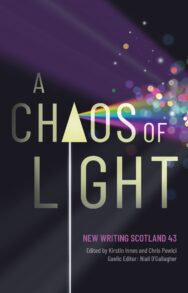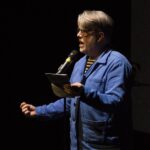‘The attic lowed like a crystal haal, last I saa her – / dark-eyed and ready tae furgit me.’
Every year we look forward to the publication of the New Writing Scotland anthology as it always highlights the best in established names and exciting newcomers in Scotland’s literary scene. The new anthology, A Chaos of Light, is fine reading as expected! Here, we publish a few poems from the collection.
A Chaos of Light: New Writing Scotland 43
Edited by Kirsten Innes, Chris Powici & Niall O’Gallagher
Published by Association of Scottish Literature
Kevin Cormack
SHORACKS
fur Tony Swain
This wis whin TVs hid thir oun national bedtime:
a vicar in a comfortable, high-backed chair
wid shepherd his mild-mannered story
aboot a window cleaner, or a trip tae the seaside,
twaards hids inevitable punchline:
‘And, you know, Jesus was a bit like that.’
At these words the TV wid sink intae a sea o white noise.
We convened in her mither’s attic,
oan an owld couch beneath the cooples,
and stared at yin churnan blizzard fur oors oan end.
Hunkered in front o her mither’s muted Grundig,
a year since wir last meeteen, we drifted oot again
intae a dwam until figures appeared.
The hoose below breathed like bellows
o an accordion; a timorous whistle, me squeaky eyes.
The attic lowed like a crystal haal, last I saa her –
dark-eyed and ready tae furgit me.
I wid lean intae that storm (o some demiurge’s
makeen) the rest o me days.
Sheu leant in different – like bliindie-bockie –
and disappeared intae tambourines and mirrors.
Shoracks: shore-dwellers of Kirkwall
bliindie-bockie: blind man’s buff
GUTS
i.m. K. H.
‘You know more than I know’ sang John Cale,
under the needle in yir student digs, twinned
wae mine. Words afore I worded thum;
clippeens o feteesh and crime scenes
afore the inkleen, the glue, the compositional eye.
Whar ye came fae and whar ye then dwelt:
that fraction o a second afore sense
reaches the brain, raffles up wae emotion,
laughter lippers ower. Whar stimuli bides
in the raa, afore adoption: colourless colour,
touchless touch and ither such blethers.
Makan me whit? A cover version – a bad wan
at that – wae virry little say in the metter?
Me intimidatan mate, as mates so often err.
The Mekon in Bowie’s black leather jaiket
fae the cover o Heroes, riflan through
vintage paperback emporiums,
as if elbuck-deep in a buullick’s liver.
Lendan me biographies o resplendent,
reckless lives – hand-me-doon
subversion fur yir second-hand sael –
designed tae mak me less and less sure.
Fae somebuddy thit nivver bowt a stick
o furnityir in his life, nivver ouwned
a fridge or washeen machine, hoose or ker,
computer or smertphone.
Zeus (as played bae Niall MacGinnis)
geen foosty in a ruined picture-hoose attic.
That’s the trouble wae classicists:
liable tae spang clear o the membrane entirely.
Blessed be the latecomers – the gulf
between stoory needle crackle
and yir bureaucratic bowels.
Reyzl Grace
BRIGADOON
for E. R. Shaffer
A think A knew, somegate,
in that first month we war girlfreinds –
We’d passt the nicht thegither,
an it wis sae haurd tae lea’ ye
in the morn, cuisten across
yer gowd-strawn bed
like a saunt’s cloak on a sunleam
whiles yer ain lay on the fluir.
Ye laucht, telt me object
permanence is a real thing
an that ye’d still be there eftir
ye walkit me tae the door.
As it shut, I cawed
oot, ‘An the door eelit
a hunner year . . .’ A wis anely
tryin tae mak ye lauch,
but ye reappeart in an instant,
luiken sae sairious,
catcht bi ma vyce afore
the joke, and then ye grint
in that aaber, elfin wey
ye dae that inveets ma tongue
like the clootie wall caws
the cuinyie in a lanely lass’s
purse. A wis late tae wark.
That wis afore A’d eaten
thae cupcakes on yer birthday –
afore A’d passt a century
watchin ye draig a fag
an then kythed tae find A’dna
been missin mair ’an a day.
Nou A knaw why
ye walk circles aroond
the flat whan things gae missin,
why yer een wirth til milk
like some Greek oracle
anent the clock, why
ye maist like daena remember
the lingelie whit apens the poyum
ye demandit, an why ye demandit
a poyum, oot aw things,
whan offert yer auchtin. Ye telt me,
aince, that ye war afeart
A wudna date ye acause
ye’re a stoner, but the suith
is A cudna lea’ ye kis ye’re a sìth.
Zain Rishi
PILLARS
Among the trees, there is a tree, the leaves
of which do not fall and is like a Muslim.
—Sahih al-Bukhari
- Sajjada
It was as if blessing the floor below her knees was
the only way she could ever stand again. Her scarf,
black and billowing, moulded to her like a dark
calcification as she said the words, , and I
couldn’t help saying them too. I didn’t know what
they meant, only that somewhere in the rhythm of
each syllable, the roughness of the middle h, was
a kind of safety: something that resembled a home.
- Taeam
Home was an unfaltering reminder that our lives
were burdened with temporality. Plastic chairs.
Plastic plates. Plastic food containers stacked like
glassy, wordless bookshelves behind the fridge.
We lived as though we were bound to leave, and
yet we could not deny our permanence, how we
pulsed out of the foreign ground like a weed, how
we only grew twofold, only deepened our roots.
iii. Hadiiqa
Roots veining below my feet, I climbed higher and
higher towards the canopy. I found my Allah in the
furrows running up the tree, in the bugs that left
them just to live below my nails. I climbed higher
and higher, leaves cleaving to me like a new flesh,
dew mottling my hair as I broke out into the daylight,
forgetting, if only for a moment, the splinters in my
palms, the bark breaching my new, ascended skin.
- Wajah
Skin that was never scarred or spotty, only plain as
bleached canvas, only warm blood bristling under
rosy white cheeks. It meant something in me was
wrong, something I could never reach, a place
I could never inhabit, a beauty I could never keep.
Because to keep a thing was to love it, and to love
a thing was to become it. So I would put on my
own skin, every day, thinking it wasn’t mine
- Rouhi
until I knew it was hers. And there are many things
I know now. That the Devil is the name we gave to
the human condition. That there are a thousand ways
to love another boy. That I never uttered an honest
prayer, not until I knew this skin was ours, that we
grew out of foreign ground, that we fell from the
canopy, our bodies glowing with sin, and prayed
for a faith where we didn’t need words at all.
A Chaos of Light: New Writing Scotland 43, edited by Kirsten Innes, Chris Powici & Niall O’Gallagher is published by Association of Scottish Literature, priced £9.95.














